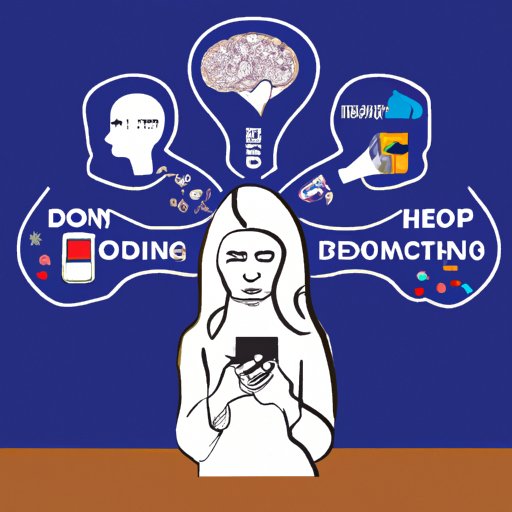Introduction
Technology addiction is a growing problem in modern society, with an increasing number of people becoming hooked on their phones, tablets, and other devices. But what makes technology so addictive? This article will explore this question by looking at the role of social media, advertising, and mental health in technology addiction.

Examining the Role of Social Media in Technology Addiction
Social media platforms such as Facebook, Twitter, and Instagram have become ubiquitous in our lives, and they play a major role in technology addiction. According to a study conducted by the Pew Research Center, nearly three-quarters of adults in the United States use social media, with the majority of those users spending more than two hours per day on these platforms.
The constant stream of information available on social media can be overwhelming, and the dopamine hit from the “likes” and comments from other users can be highly addictive. As Dr. Pamela Rutledge, director of the Media Psychology Research Center, explains: “The brain releases dopamine when we experience something pleasurable or satisfying, like getting ‘likes’ on a post. That reinforces the behavior and encourages us to do it again.”
Furthermore, the algorithms used by social media platforms are designed to ensure that users stay engaged, which can lead to compulsive behavior. As Tristan Harris, former design ethicist at Google, states: “Our minds can be hijacked by our own tech products… The attention economy is the only economy that runs on an infinite cycle. It runs on an infinite loop of you wanting to pay attention to it and it trying to grab your attention.”

The Impact of Social Media on Mental Health
Not only can social media lead to compulsive behaviors, but it can also have a negative impact on mental health. A recent study published in the Journal of Social and Clinical Psychology found that frequent use of social media was associated with higher levels of depression and anxiety. Other studies have shown that social media can also lead to feelings of loneliness, envy, and dissatisfaction with one’s own life.

Exploring the Psychological and Physiological Effects of Technology Addiction
In addition to the psychological effects of technology addiction, there are also physiological effects. According to a study published in Frontiers in Psychiatry, prolonged use of digital devices can lead to physical symptoms such as headaches, fatigue, and neck pain, as well as problems with sleep. Prolonged use of digital devices can also disrupt the body’s circadian rhythm, leading to further health issues.
Analyzing the Impact of Advertising on Technology Consumption
Advertising plays a major role in technology addiction, as companies use targeted ads to encourage people to buy and use their products. These ads are often tailored to individual users, making them more likely to click on the ad and purchase the product. Additionally, companies use persuasive techniques such as discounts, free trials, and limited-time offers to entice users to buy their products.
As Professor Tanya L. Chartrand of Duke University explains: “Advertisers are increasingly targeting consumers based on their online behavior, creating personalized ads that target different users in different ways. This makes it hard for people to resist the temptation to click on an ad, even if they know it’s not good for them.”
Investigating the Link Between Technology Addiction and Mental Health
There is a growing body of research linking technology addiction to mental health issues such as depression, anxiety, and stress. A recent study published in Nature Human Behaviour found that people who spend more time on digital devices are more likely to have symptoms of depression and anxiety. Additionally, a study published in the American Journal of Preventive Medicine found that excessive use of digital devices was linked to higher levels of stress.
Furthermore, research has shown that people who are addicted to technology are more likely to suffer from low self-esteem, difficulty concentrating, and difficulty forming relationships. As Dr. Elizabeth Waterman, clinical psychologist and author of Growing Up Digital, explains: “When we’re addicted to technology, we’re constantly seeking out external validation and gratification, which can lead to feelings of insecurity and low self-esteem.”
Assessing the Benefits and Risks of Technology Addiction
Although technology addiction can have serious consequences, it is important to recognize that there are also benefits to using technology. For instance, technology can be used to connect with friends and family, access information, and pursue hobbies and interests. Additionally, technology can help people stay organized and productive.
However, it is important to remember that technology addiction can also have serious risks. Excessive use of digital devices can lead to physical and mental health problems, as well as problems with relationships and productivity. As such, it is important to be aware of the potential risks of technology addiction and take steps to limit its negative impacts.
Conclusion
In conclusion, technology addiction is a growing problem in modern society, and it is important to understand what makes technology so addictive. This article has explored the role of social media, advertising, and mental health in technology addiction, as well as the psychological and physiological effects of technology addiction. Additionally, it has discussed the potential benefits and risks of technology addiction. Ultimately, it is important to be aware of the potential harms of technology addiction and take steps to limit its negative impacts.
(Note: Is this article not meeting your expectations? Do you have knowledge or insights to share? Unlock new opportunities and expand your reach by joining our authors team. Click Registration to join us and share your expertise with our readers.)

These are great articles! Well written with excellent examples, study references, and reasons for for concern about digital addictions that threaten the fabric of our society without more awareness about the importance of mindful use.